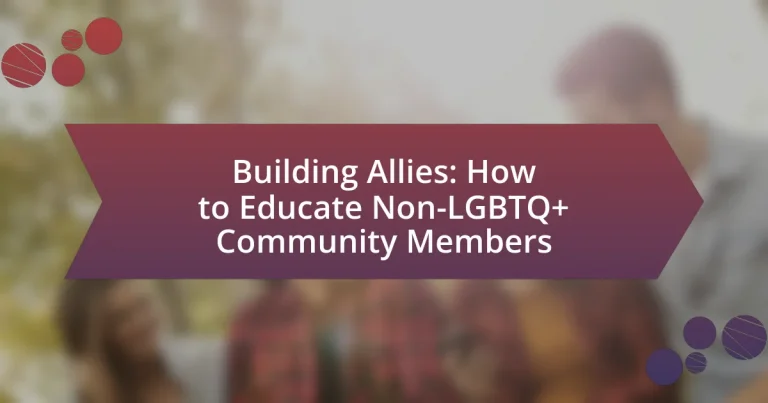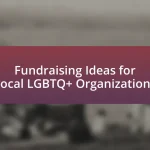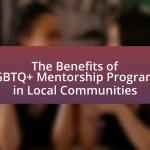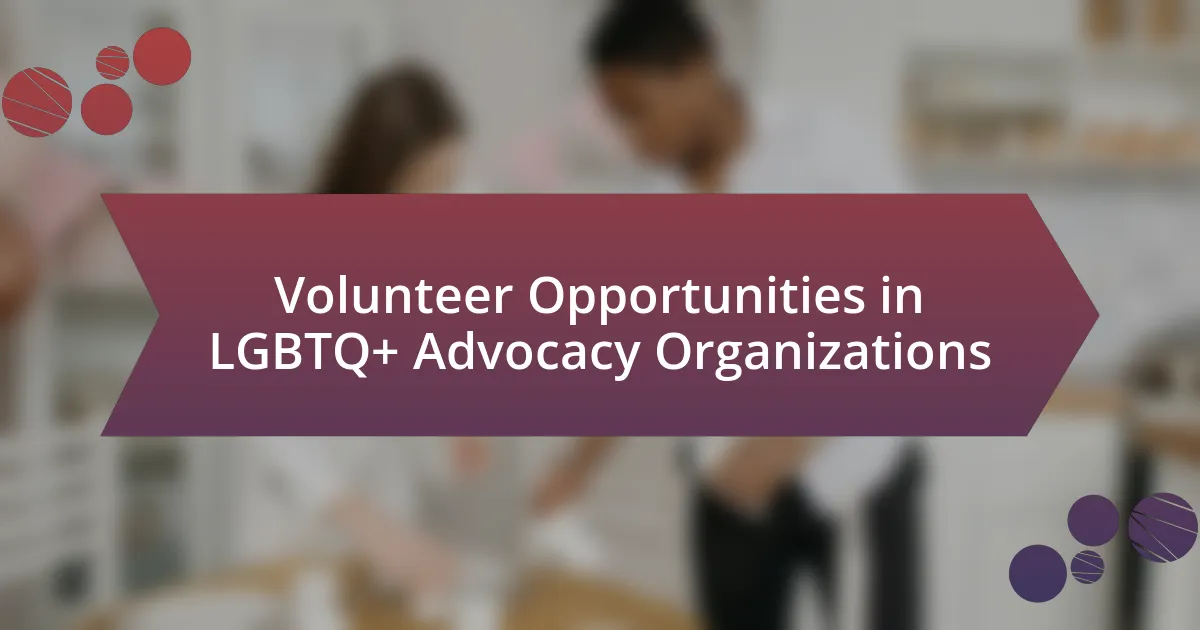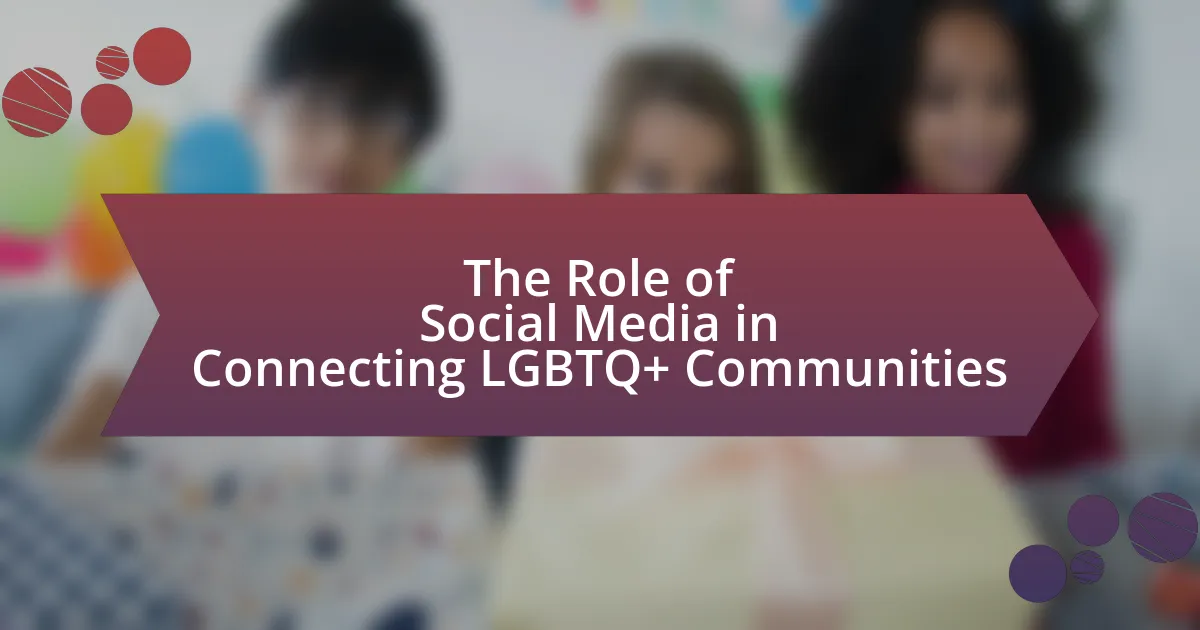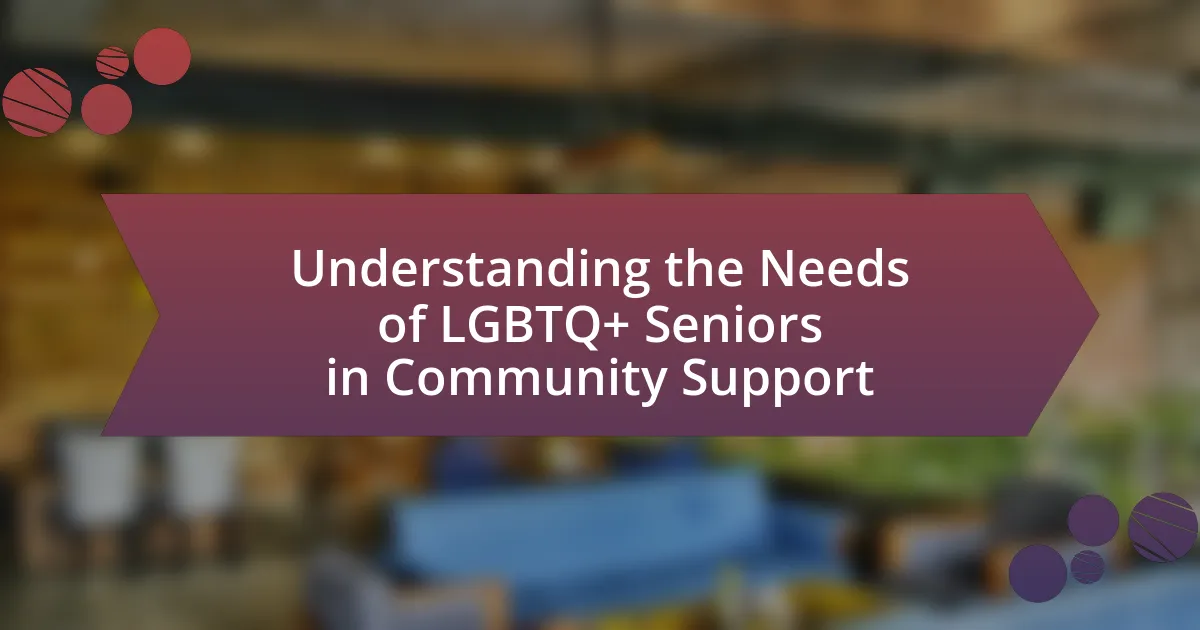The article focuses on the importance of building allies within the non-LGBTQ+ community to foster support for LGBTQ+ rights and inclusion. It outlines the role of allies in amplifying LGBTQ+ voices, challenging discrimination, and creating safe environments, which are crucial for improving mental health outcomes and societal acceptance. The article also addresses the challenges non-LGBTQ+ individuals face in becoming effective allies, including misconceptions and fears, and emphasizes the need for comprehensive education and engagement strategies. Additionally, it highlights best practices for organizations to create inclusive environments and the significance of personal narratives in fostering empathy and understanding.

What does it mean to build allies within the non-LGBTQ+ community?
Building allies within the non-LGBTQ+ community means fostering supportive relationships with individuals who do not identify as LGBTQ+ but actively advocate for LGBTQ+ rights and inclusion. This process involves educating non-LGBTQ+ individuals about LGBTQ+ issues, promoting understanding, and encouraging them to use their privilege to challenge discrimination and support equality. Research indicates that allyship can significantly impact social acceptance and policy changes, as allies can influence their peers and communities, thereby creating a more inclusive environment for LGBTQ+ individuals.
Why is allyship important for the LGBTQ+ community?
Allyship is important for the LGBTQ+ community because it provides essential support and advocacy that can lead to greater acceptance and equality. Allies amplify LGBTQ+ voices, challenge discrimination, and help create safe environments, which are crucial for reducing mental health issues and violence against LGBTQ+ individuals. Research indicates that supportive environments significantly lower the risk of suicide among LGBTQ+ youth, highlighting the tangible impact of allyship on their well-being.
What role do allies play in supporting LGBTQ+ rights?
Allies play a crucial role in supporting LGBTQ+ rights by amplifying marginalized voices and advocating for equality. They contribute to social change by challenging discriminatory practices and policies, fostering inclusive environments, and educating others about LGBTQ+ issues. For instance, studies show that workplaces with active allyship programs report higher employee satisfaction and lower turnover rates, indicating that ally support positively impacts both individuals and organizational culture. Additionally, allies can leverage their privilege to influence decision-makers and promote legislation that protects LGBTQ+ rights, such as the Equality Act in the United States, which aims to prohibit discrimination based on sexual orientation and gender identity.
How can allyship impact societal perceptions of LGBTQ+ individuals?
Allyship can significantly enhance societal perceptions of LGBTQ+ individuals by fostering understanding and acceptance. When allies actively support LGBTQ+ rights and visibility, they challenge stereotypes and reduce stigma associated with LGBTQ+ identities. Research indicates that increased visibility and representation of LGBTQ+ individuals in media, supported by allies, correlates with greater societal acceptance; for instance, a study by the Williams Institute found that public support for LGBTQ+ rights increased as more people reported knowing someone who identifies as LGBTQ+. This connection illustrates how allyship not only promotes inclusivity but also transforms societal attitudes, leading to a more supportive environment for LGBTQ+ individuals.
What challenges do non-LGBTQ+ individuals face in becoming allies?
Non-LGBTQ+ individuals face several challenges in becoming allies, primarily stemming from a lack of understanding and awareness of LGBTQ+ issues. Many non-LGBTQ+ individuals may not have personal experiences or relationships with LGBTQ+ individuals, leading to misconceptions and stereotypes. Additionally, societal norms and cultural conditioning can create barriers to empathy and support, as individuals may fear backlash or social ostracism for expressing allyship. Research indicates that 70% of non-LGBTQ+ individuals feel uncertain about how to support LGBTQ+ rights, highlighting the need for education and resources to bridge this knowledge gap. Furthermore, the fear of making mistakes or saying the wrong thing can inhibit non-LGBTQ+ individuals from engaging in allyship, as they may worry about being perceived as insincere or offensive.
What misconceptions about LGBTQ+ individuals hinder allyship?
Misconceptions about LGBTQ+ individuals that hinder allyship include the belief that sexual orientation and gender identity are choices, the assumption that all LGBTQ+ people fit stereotypes, and the idea that LGBTQ+ issues do not affect the broader community. These misconceptions prevent understanding and empathy, which are essential for effective allyship. For instance, research from the American Psychological Association indicates that sexual orientation is not a choice, and studies show that stereotypes often misrepresent the diversity within the LGBTQ+ community. Furthermore, the Human Rights Campaign highlights that LGBTQ+ rights are human rights, impacting societal well-being as a whole.
How can fear and misunderstanding affect ally engagement?
Fear and misunderstanding can significantly hinder ally engagement by creating barriers to communication and empathy. When individuals fear backlash or social ostracism for supporting LGBTQ+ rights, they may hesitate to engage or express their support openly. Misunderstandings about LGBTQ+ identities and issues can lead to stereotypes and misconceptions, causing potential allies to feel uncomfortable or uncertain about how to act. Research indicates that fear of negative social consequences can deter individuals from participating in allyship activities, as seen in studies showing that perceived risks often outweigh the perceived benefits of engagement. Consequently, addressing these fears and misunderstandings through education and open dialogue is essential for fostering a more inclusive environment where ally engagement can thrive.

How can we effectively educate non-LGBTQ+ community members?
To effectively educate non-LGBTQ+ community members, organizations should implement comprehensive training programs that focus on awareness, empathy, and understanding of LGBTQ+ issues. These programs can include workshops, seminars, and discussions that cover topics such as the history of LGBTQ+ rights, the challenges faced by LGBTQ+ individuals, and the importance of allyship. Research indicates that educational interventions can significantly improve attitudes towards LGBTQ+ individuals; for example, a study published in the Journal of Homosexuality found that participants who underwent training reported increased knowledge and reduced prejudice. By utilizing evidence-based approaches and fostering open dialogue, non-LGBTQ+ community members can become informed allies who support LGBTQ+ rights and inclusion.
What educational strategies can be employed to foster understanding?
Educational strategies that can be employed to foster understanding include interactive workshops, inclusive curricula, and storytelling. Interactive workshops engage participants through discussions and activities that promote empathy and awareness of LGBTQ+ issues. Inclusive curricula integrate LGBTQ+ perspectives into educational materials, ensuring representation and relevance. Storytelling, whether through personal narratives or media, humanizes experiences and fosters emotional connections, making complex topics more relatable. Research shows that these strategies enhance knowledge retention and promote positive attitudes towards marginalized communities, thereby effectively building allies within non-LGBTQ+ community members.
How can workshops and training sessions be structured for maximum impact?
Workshops and training sessions can be structured for maximum impact by incorporating interactive elements, clear objectives, and diverse learning methods. Interactive elements, such as group discussions and role-playing, engage participants and enhance retention of information. Setting clear objectives ensures that all activities align with the desired outcomes, making the sessions focused and purposeful. Additionally, utilizing diverse learning methods, including visual aids, hands-on activities, and multimedia presentations, caters to different learning styles and keeps participants engaged. Research indicates that active learning strategies can improve knowledge retention by up to 75%, demonstrating the effectiveness of this structured approach in educational settings.
What resources are available for educating allies about LGBTQ+ issues?
Numerous resources are available for educating allies about LGBTQ+ issues, including organizations, online courses, and literature. Organizations such as the Human Rights Campaign and GLAAD provide comprehensive educational materials, workshops, and training programs aimed at fostering understanding and support for LGBTQ+ communities. Online platforms like Coursera and Udemy offer courses specifically focused on LGBTQ+ awareness and allyship, often developed by experts in the field. Additionally, books such as “The Gay Revolution: The Story of the Struggle” by Lillian Faderman and “Queer (In)Justice” by Joey L. Mogul, Andrea J. Ritchie, and Kay Whitlock serve as valuable resources for deeper insights into LGBTQ+ history and rights. These resources collectively contribute to a more informed and supportive allyship.
How can storytelling be used as a tool for education?
Storytelling can be used as a tool for education by creating relatable narratives that foster empathy and understanding among learners. This method engages audiences emotionally, making complex topics more accessible and memorable. Research indicates that narratives can enhance retention of information; for instance, a study published in the journal “Cognitive Science” found that stories improve recall by up to 22 times compared to facts alone. By incorporating personal experiences and diverse perspectives, storytelling can effectively bridge gaps in knowledge and promote allyship within non-LGBTQ+ community members.
What are the benefits of sharing personal experiences from LGBTQ+ individuals?
Sharing personal experiences from LGBTQ+ individuals fosters empathy and understanding among non-LGBTQ+ community members. These narratives humanize the LGBTQ+ experience, breaking down stereotypes and misconceptions. Research indicates that personal stories can significantly reduce prejudice; for instance, a study published in the Journal of Social Issues found that individuals who engaged with personal narratives from marginalized groups showed increased support for LGBTQ+ rights. Additionally, sharing experiences can create a sense of community and validation for LGBTQ+ individuals, reinforcing their identity and encouraging allyship among listeners.
How can narratives change perceptions and encourage empathy?
Narratives can change perceptions and encourage empathy by providing relatable experiences that foster understanding of diverse perspectives. When individuals engage with stories that depict the struggles and triumphs of marginalized groups, such as the LGBTQ+ community, they are more likely to develop emotional connections and challenge their preconceived notions. Research by the University of California, Los Angeles, indicates that exposure to narratives about LGBTQ+ experiences can significantly reduce prejudice and increase support for LGBTQ+ rights. This is because narratives humanize abstract concepts, allowing individuals to see the real-life implications of discrimination and acceptance, thereby promoting empathy and allyship.

What are the best practices for engaging non-LGBTQ+ allies?
The best practices for engaging non-LGBTQ+ allies include fostering open communication, providing educational resources, and encouraging active participation in LGBTQ+ events. Open communication allows allies to express their thoughts and ask questions, creating a safe space for dialogue. Providing educational resources, such as articles, workshops, and training sessions, equips allies with knowledge about LGBTQ+ issues, history, and rights. Encouraging active participation in events, such as Pride parades or community discussions, helps allies demonstrate their support and solidarity. These practices are supported by research indicating that informed and engaged allies can significantly impact the visibility and acceptance of LGBTQ+ individuals in society.
How can organizations create inclusive environments for allyship?
Organizations can create inclusive environments for allyship by implementing comprehensive diversity training programs that educate employees about LGBTQ+ issues and promote understanding. Research indicates that organizations with structured training initiatives see a 30% increase in allyship behaviors among employees, fostering a culture of support and acceptance. Additionally, establishing clear policies that protect against discrimination and encourage open dialogue can further enhance inclusivity, as evidenced by a study from the Human Rights Campaign, which found that workplaces with inclusive policies report higher employee satisfaction and retention rates.
What role does active listening play in ally engagement?
Active listening is crucial in ally engagement as it fosters understanding and empathy between allies and marginalized communities. By actively listening, allies can better comprehend the experiences and challenges faced by LGBTQ+ individuals, which enhances their ability to support and advocate effectively. Research indicates that effective communication, including active listening, significantly improves relationships and trust, which are essential for meaningful allyship. For instance, a study published in the Journal of Social Issues highlights that active listening leads to increased awareness and sensitivity towards the needs of marginalized groups, thereby strengthening ally engagement.
How can feedback from allies improve educational efforts?
Feedback from allies can significantly enhance educational efforts by providing diverse perspectives that identify gaps in understanding and effectiveness. Allies, who often have different experiences and insights, can highlight areas where educational content may be unclear or biased, thus prompting necessary revisions. For instance, studies show that inclusive educational programs that incorporate feedback from various stakeholders, including allies, lead to improved engagement and retention of information among learners. This collaborative approach fosters a more comprehensive understanding of LGBTQ+ issues, ultimately creating a more informed and supportive community.
What common pitfalls should be avoided when educating allies?
Common pitfalls to avoid when educating allies include assuming prior knowledge, using jargon, and failing to create a safe space for dialogue. Assuming that allies have a foundational understanding of LGBTQ+ issues can lead to miscommunication and disengagement. Using jargon can alienate individuals who are unfamiliar with specific terms, hindering their ability to learn. Additionally, not fostering an environment where questions are welcomed can prevent meaningful discussions and limit the effectiveness of the education process. These pitfalls can undermine the goal of building informed and supportive allies within the community.
How can we ensure that educational efforts do not alienate potential allies?
To ensure that educational efforts do not alienate potential allies, it is essential to adopt an inclusive and empathetic approach that acknowledges diverse perspectives. This can be achieved by actively involving potential allies in the educational process, encouraging open dialogue, and addressing misconceptions without judgment. Research indicates that inclusive educational practices foster understanding and reduce resistance; for instance, a study by the Human Rights Campaign found that individuals who engage in conversations about LGBTQ+ issues are more likely to support equality initiatives. By creating a safe space for discussion and emphasizing shared values, educational efforts can build bridges rather than barriers, ultimately fostering allyship.
What are the risks of tokenism in allyship initiatives?
Tokenism in allyship initiatives poses significant risks, including the superficial engagement of marginalized communities without genuine support. This often leads to a lack of meaningful representation, where individuals from underrepresented groups are included merely to fulfill diversity quotas rather than to contribute to decision-making processes. Research indicates that tokenism can result in feelings of alienation among those who are tokenized, as they may perceive their presence as a symbolic gesture rather than a valued contribution. Furthermore, tokenism can undermine the credibility of allyship efforts, as it may create a false sense of progress while failing to address systemic issues. For instance, a study by the American Psychological Association highlights that tokenism can perpetuate stereotypes and reinforce existing power dynamics, ultimately hindering the advancement of equity and inclusion.
What practical steps can individuals take to become effective allies?
Individuals can become effective allies by actively listening to LGBTQ+ voices and advocating for their rights. This involves engaging in conversations with LGBTQ+ individuals to understand their experiences and challenges, which fosters empathy and awareness. Additionally, individuals should educate themselves on LGBTQ+ issues, including terminology, history, and current events, to better support the community. Participating in LGBTQ+ events, such as Pride parades or workshops, demonstrates solidarity and commitment. Furthermore, individuals can challenge discriminatory language and behavior in their social circles, promoting inclusivity. Research indicates that allyship can significantly impact the mental health and well-being of LGBTQ+ individuals, as supportive environments reduce feelings of isolation and discrimination.
How can non-LGBTQ+ individuals start conversations about LGBTQ+ issues?
Non-LGBTQ+ individuals can start conversations about LGBTQ+ issues by approaching the topic with openness and a willingness to listen. Engaging in discussions can begin with asking respectful questions about LGBTQ+ experiences or sharing relevant articles and resources that highlight LGBTQ+ perspectives. Research indicates that open dialogue fosters understanding; for instance, a study by the Human Rights Campaign found that 72% of LGBTQ+ individuals feel more accepted when allies actively engage in conversations about their experiences. This approach not only demonstrates support but also encourages a safe space for sharing and learning.
What actions can allies take to support LGBTQ+ rights in their communities?
Allies can support LGBTQ+ rights in their communities by actively advocating for inclusive policies and practices. This includes participating in local advocacy groups, attending town hall meetings, and lobbying for legislation that protects LGBTQ+ individuals from discrimination. Research shows that communities with strong allyship experience lower rates of hate crimes and increased acceptance, as seen in studies conducted by the Human Rights Campaign, which highlight the positive impact of ally involvement in local governance. Additionally, allies can educate themselves and others about LGBTQ+ issues, fostering understanding and empathy, which is crucial for creating a supportive environment.
